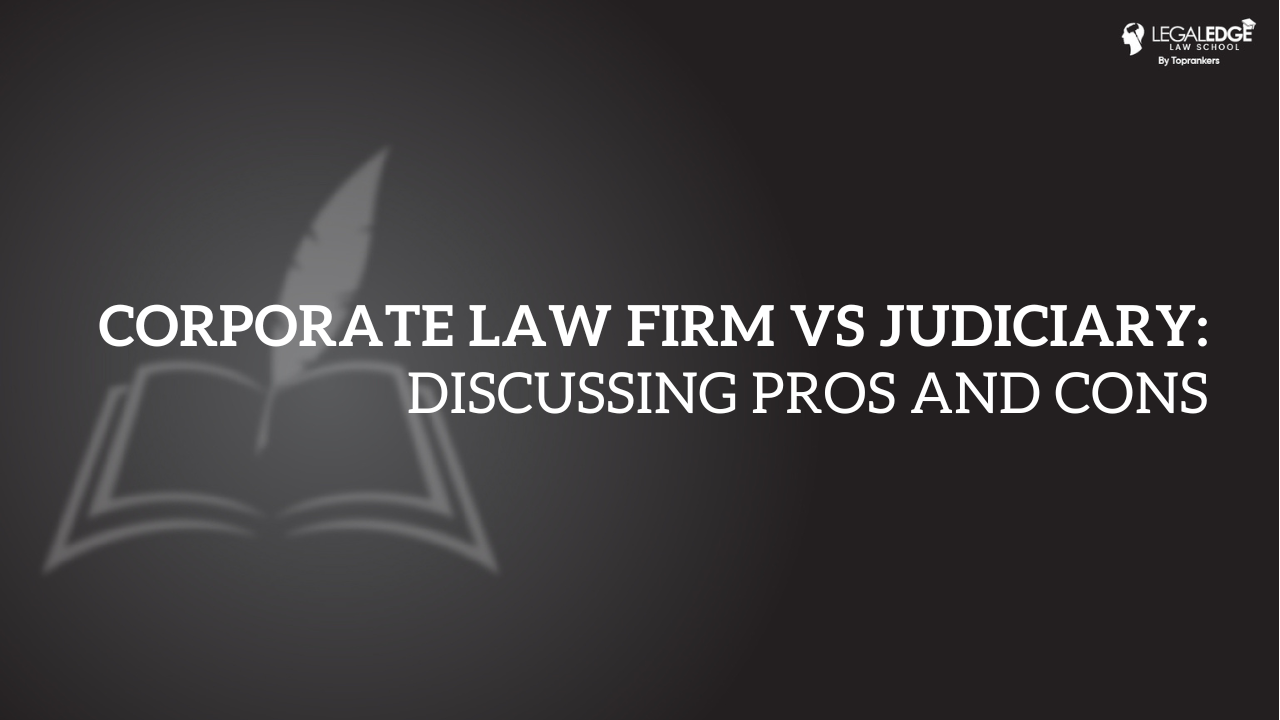INTRODUCTION :-
When it comes to pursuing a career in the legal field, one of the major decisions that aspiring lawyers have to make is whether to work in a corporate law firm or in the judiciary. Both paths offer unique opportunities, but they also come with their own set of advantages and disadvantages. In this article, we will explore the pros and cons of corporate law firm jobs versus judiciary jobs, providing valuable insights to help you make an informed decision about your legal career.
CORPORATE LAW FIRM JOBS :-
- High Earning Potential: Corporate law firms often offer lucrative salaries and bonuses, making it an attractive option for those who are motivated by financial rewards. Successful lawyers can earn significant incomes, especially at large, prestigious firms.
- Diverse Practice Areas: Corporate law firms handle a wide range of legal matters, allowing lawyers to gain exposure to various practice areas such as mergers and acquisitions, intellectual property, securities, and more. This diversity can be intellectually stimulating and provide valuable experience.
- Networking Opportunities: Working at a corporate law firm provides ample networking opportunities, allowing lawyers to build relationships with influential industry professionals, potential clients, and fellow attorneys. This network can prove invaluable throughout one’s career.
- Prestige and Reputation: Top-tier law firms often have a strong reputation for excellence, which can provide a significant boost to your professional image. Being associated with a renowned firm can open doors to exciting opportunities and enhance your credibility in the legal community.
- Long Work Hours: Working in a corporate law firm often translates to long hours and strict deadlines. This demanding work environment may lead to a poor work-life balance, potentially impacting personal relationships and overall well-being.
- Intense Pressure: Corporate law firms are known for their high-pressure environments. Lawyers are expected to perform at an exceptional level, often dealing with complex cases and demanding clients. This constant pressure can be stressful and may not suit everyone’s temperament.
- Limited Control Over Cases: In a corporate law firm, lawyers often work on cases assigned to them by partners or senior attorneys. This means that you may not have full control over the types of cases you handle, limiting your ability to specialize in a particular area of law.
JUDICIARY JOBS :-
- Public Service and Impact: Working in the judiciary allows lawyers to directly contribute to the administration of justice and uphold the rule of law. This sense of public service can be fulfilling, knowing that you are making a positive impact on society.
- Job Security: Once appointed to a judicial position, job security is typically high. Judiciary jobs offer stability and regular income, providing a level of financial security that may not be as predictable in private practice.
- Intellectual Challenge: Adjudicating legal disputes requires a deep understanding of the law, critical thinking skills, and the ability to analyze complex legal issues. For those who enjoy intellectual challenges, a judiciary job can be highly stimulating.
- Professional Growth: Working in the judiciary provides opportunities for professional growth, including the potential for upward mobility within the judicial system. With experience, judges can be appointed to higher courts, expanding their influence and expertise.
- Lower Earning Potential: In comparison to corporate law firm jobs, judiciary jobs generally offer lower salaries. While job security is a valuable aspect, the financial rewards may not be as significant as those available in private practice.
- Limited Practice Areas: Unlike corporate law firms that handle a wide range of cases, judges often specialize in specific areas of law based on their assigned court. This specialization means that judges may not get exposure to as many diverse legal matters as their corporate law counterparts.
- Restricted Decision-Making: Judges are bound by strict legal doctrines, precedents, and the rule of law. This can limit their ability to make decisions based on personal beliefs or considerations outside the scope of the law. Some may find this restriction constraining.
CONCLUSION :-
Whether you choose to pursue a career in a corporate law firm or in the judiciary, it is important to carefully consider the pros and cons of each path. Corporate law firm jobs offer high earning potential, diverse practice areas, and networking opportunities, but come with long work hours and intense pressure. On the other hand, judiciary jobs provide public service, job security, and intellectual challenges, but may have lower earning potential and restricted decision-making.
Ultimately, the decision should align with your personal goals, values, and priorities. Remember that there is no one-size-fits-all answer, as individual preferences and circumstances vary. By weighing the pros and cons outlined in this article, you can make an informed choice that sets you on a fulfilling and successful legal career path.
This article presents the insights of?PRIYANKA G.
, a 3rd year student at Janardan Rai Nagar Rajasthan Vidyapeeth University
. The author's perspectives and opinions are entirely based on their personal viewpoint.
